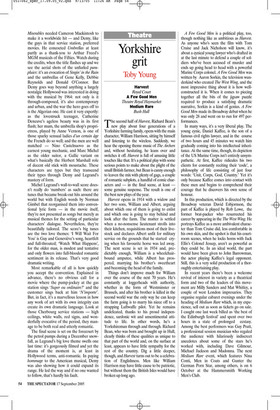Yorkshire grit
Toby Young
Harvest Royal Court A Few Good Men Theatre Royal Haymarket Medium Rare Bush Hall
The second half of Harvest, Richard Bean’s new play about four generations of a Yorkshire farming family, opens with the main character, William Harrison, sitting by himself and listening to the wireless. Suddenly, we hear the opening theme music of The Archers and, without hesitating, he leans over and switches it off. Harvest is full of amusing little touches like that. It’s a political play with some serious points to make about the plight of the small British farmer, but Bean is canny enough to leaven the mix with plenty of gags, a couple of romantic subplots, a handful of comic characters and — in the final scene, at least some genuine suspense. The result is one of the best new plays of the year.
Harvest opens in 1914 with a widow and her two sons, William and Albert, arguing about which one of them is going to enlist and which one is going to stay behind and look after the farm. The matter is settled when a no-nonsense lieutenant strolls into their kitchen, requisitions most of their livestock and declares Albert unfit for military service on the grounds that he started crying when his favourite horse was led away. The next scene is set in 1934 and, predictably enough, William is a wheelchairbound amputee, while Albert has prospered, marrying his brother’s sweetheart and becoming the head of the family.
Things don’t improve much for William over the course of the next 70 years. He’s constantly at loggerheads with authority, whether in the form of Westminster or Brussels, and after his brother is killed in the second world war the only way he can keep the farm going is to marry his niece off to a strapping Luftwaffe pilot. Yet he remains undefeated, thanks to his proud independence, sardonic wit and unsentimental attitude to life. In other words, he’s a Yorkshireman through and through. Richard Bean, who was born and brought up in Hull, clearly thinks of these qualities as unique to that part of the world and, on the surface at least, appears to have little sympathy for the rest of the country. Dig a little deeper, though, and Harvest turns out to be a celebration of Englishness. Men like William Harrison may have little cause to be patriotic, but without them the British Isles would have broken up long ago. A Few Good Men is a political play, too, though nothing like as ambitious as Harvest. As anyone who’s seen the film with Tom Cruise and Jack Nicholson will know, it’s about a cynical young lawyer who’s drafted in at the last minute to defend a couple of soldiers who’ve been accused of murder and ends up going head to head with a powerful Marine Corps colonel. A Few Good Men was written by Aaron Sorkin, the television wunderkind who created The West Wing, and the most impressive thing about it is how wellconstructed it is. When it comes to piecing together all the bits of the jigsaw puzzle required to produce a satisfying dramatic narrative, Sorkin is a kind of genius. A Few Good Men made its Broadway debut when he was only 28 and went on to run for 497 performances.
In many ways, it’s a very liberal play. The young cynic, Daniel Kaffee, is the son of a famous civil rights lawyer, and in the course of two hours and 45 minutes we watch him gradually coming into his intellectual inheritance. At the same time, though, its depiction of the US Marine Corps isn’t entirely unsympathetic. At first, Kaffee ridicules his two clients for constantly reciting their ‘code’, a philosophy of life consisting of just four words: ‘Unit, Corps, God, Country.’ Yet it’s only because Kaffee comes into contact with these men and begins to comprehend their courage that he discovers his own sense of honour.
In this production, which is directed by the Broadway veteran David Esbjornson, the part of Kaffee is played by Rob Lowe, the former brat-packer who resurrected his career by appearing in the The West Wing. He portrays Kaffee as a more ambivalent character than Tom Cruise did, less comfortable in his own skin, and the upshot is that his courtroom scenes, when he locks horns with Jack Ellis’s Colonel Jessep, aren’t as powerful as they could be. In an ideal world, the part would have been given to John Barrowman, the actor playing Kaffee’s legal opponent. Still, this is a very solid production of a thoroughly entertaining play.
In recent years there’s been a welcome revival of interest in variety as a theatrical form and two of the leaders of this movement are Milly Sanders and Mat Whitley, a couple of west London impresarios. They organise regular cabaret evenings under the heading of Medium Rare which, in my experience, sell out as soon as tickets go on sale. I caught one last week billed as ‘the best of the Edinburgh festival’ and spent over two hours in a state of prolonged ecstasy. Among the best performers was Guy Pratt, a professional session musician who regaled the audience with hilariously indiscreet anecdotes about some of the stars he’s worked with, including Dave Gilmour, Michael Jackson and Madonna. The next Medium Rare event, which features Nina Conti, Men in Coats and Gunter the German Porn Star, among others, is on 6 October at the Hammersmith Working Men’s Club.



















































 Previous page
Previous page